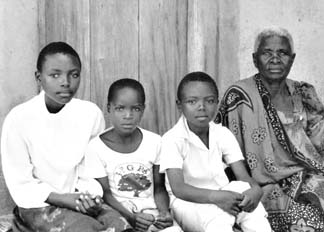|
|
Double Tragedy for Granny
By Bamuturaki Musinguzi, The East African
Uganda
January 25, 2006

Picture from Africa Recovery, United Nations; Ana Nansubuga, 81 years old, with three of the 11 grandchildren she looks after, since most of their parents died of AIDS.
With a playful crowd of children surrounding her on a mat, a passerby may think that Norah Nassolo Nakayima is a happy grandmother, until she narrates the ordeal of looking after her 21 grandchildren.
Nakayima, who cannot remember her age, had two sons and daughters. She lost her husband a quarter of a century ago. He left her a plot of land and two houses and no steady income in Mugowa zone, a slum area in Kawempe Division of Kampala.
Two of her children have since died of Aids, leaving eight children in the care of their grandmother. As if that were not enough, five of the eight grandchildren died too - mostly from Aids - leaving her with great-grandchildren. Her only surviving son is bedridden, suffering from Aids, the disease to which he lost his three wives.
Some of the other children that she is taking care of are orphans of family members. Nakayima's five dead grandchildren were the most reliable breadwinners for the poor urban family.
"It's too bad that the five have died; I could not even go to their funerals because I have high blood pressure. I'm weak and have a problem with my eyes. Someone has to lead me into and out of the main house," she said.
"I cry instead of being happy, resting and relaxing, she says. And, in a jocular tone, adds, "I would even have put on weight in my old age."
Nakayima's 21 charges are only a small part of the estimated 11 million HIV/Aids orphans scattered across sub-Saharan Africa, two million of them in Uganda - often all living under the care of people like Nakayima.
And as the pandemic continues to claim more lives, grandparents are taking on the responsibility of looking after an increasing number of orphans providing food, shelter, education and warmth.
More older people are expected to fund medical costs - antiretroviral therapy, home-based care such as anti-fungal soaps, oral dehydration salts, food, water, school fees and uniforms for orphans and vulnerable children.
HelpAge International, a non-governmental organisation that looks after the interests of the elderly, says that in Mozambique, credit funds were set up to provide loans to older people and other community members used to set up small businesses such as goat trading.
Half of the interest was put back into the credit fund and the other half used to create a village social fund. Managed by older people's committees, the funds are used to help meet the basic needs of older carers and pay for transport costs to help the HIV-positive access treatment.
In South Africa, older people caring for grandchildren are eligible for social grants and school fees exemptions and a regular cash payment.
Often, it is the elderly who are the final line of help caring for their sick children. They have no training; they come into contact with body fluids and sometimes lack protective gear such as gloves and are at a risk of contracting the disease.
When the children are gone, they lose economic support and the grandchildren fall back on them. With an average 7.2 children per family in Uganda, the death of mother and father leaves a huge hole.
"Aids is one thing that has caused the greatest affliction to the elderly in Africa," Uganda Reach the Aged Association (URAA) chief executive officer Deborah Kaijuka said. "It's a double tragedy in Africa because there is a lot of investment in children as insurance to a parent's old age."
According to the 2002 Uganda Population and Housing Census, the elderly (over 60 years of age) constitute 6.1 per cent (1.525 million) of the total population of about 25 million, compared with 4.1 per cent (686,260) in 1991.
The association sensitises the elderly about HIV/Aids, as they are often left out in mainstream programmes.
Aids is depleting whatever income the elderly have. They have to look after sick children and by the time the children die, everything is gone and there are grandchildren to look after.
HIV/Aids prevention programme efforts must, therefore, address people of all ages to be fully effective, says HelpAge International.
Bwaise Disabled and Elderly Association (BDEA) is an affiliate of URAA, which gives loans to the elderly to help the likes of Nakayima.
Nakayima received Ush200,000 ($111) in July 2005 to pay school fees and repair a small house - which she rents out for Ush15,000 per month (85 US cents).
But this is not enough. There are seven grandchildren in primary school, four in secondary school and four of nursery school age.
Ms Kaijuka said her association supports four groups like BDEA in Jinja, Kamuli and Iganda districts in eastern Uganda.
Together, the organisations reach out to 427 older persons who care for a total of 2,135 orphaned children.
|
|



